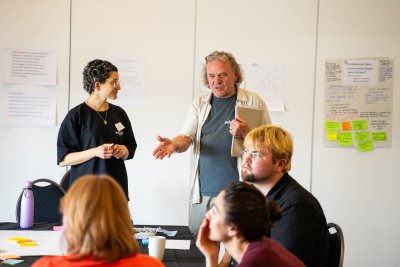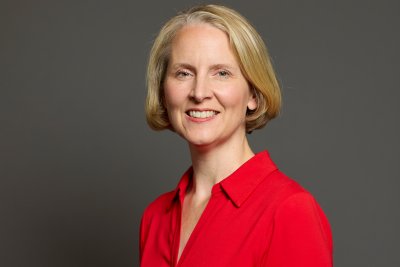 Lucy Heyderman and Ben Messer facilitating. Credit: Tay Aziz
Lucy Heyderman and Ben Messer facilitating. Credit: Tay Aziz

Allyship and solidarity: creating brave spaces for systems change
Welcome to our third round up from The Gathering Table: a summit on racial justice in food and farming. We explore how those working in food and farming can build brave spaces for honest conversations, challenge systemic inequality and practise meaningful allyship.
How can we foster allyship in our communities as white or white presenting people that are in close proximity to power and privilege.
And what strategies can we utilise to create environments where everyone feels safe and valued?
These were the central questions explored in Solidarity and Allyship: Creating Brave Spaces. The workshop was led by Ben Messer, Community Engagement and Participation Lead at Food Matters and Sustainable Food Places' lead on Representation and Justice He was joined by co-facilitator, Lucy Heyderman, Citizen Engagement Manager at The Food Foundation.

Workshop aims
To stimulate thinking, share experiences and explore active allyship in the context of food and racial justice.
What was discussed?
Setting the Scene: Food and Racial Justice
The session began with a reflection on food and racial justice, acknowledging that systemic inequalities in access, voice, and representation persist in the UK food system. Participants were invited to consider where they sit within these systems and how their identities impact their relationship to power and privilege.
What is a Brave Space?
Participants reflected on, What does a brave space mean to you?
Rather than striving for comfort or neutrality, brave spaces recognise that difficult, emotional, and sometimes uncomfortable conversations are necessary for real change. This set the tone for the rest of the session.
The Gathering Table: A Collective Reflection
Using the setting of The Gathering Table summit, attendees were invited to discuss:
- Whether the current space felt brave to them.
- What contributes to a brave space and what detracts from it.
- Lessons learned from being in spaces that felt inclusive and supportive.
- How these practices could be applied in their own organisations or projects.
What Makes a ‘Good Ally’?
The group explored the qualities and actions associated with meaningful allyship. There was an emphasis on shifting from performative gestures to sustained, thoughtful, and sometimes uncomfortable action which stands in solidarity with marginalised folks (read more about solidarity tools in the handout below).

Key learnings: what makes a brave space?
Essentials of brave spaces
Brave spaces require collective intention and a shared commitment to honesty, respect, and emotional safety. They acknowledge complexity and conflict, hold space for different emotions (including discomfort and anger), and encourage us to move beyond the status quo. They are spaces where diverse perspectives are valued and where power dynamics are named.
Factors that influence brave spaces
- A facilitator who shares power while guiding the conversation.
- Setting clear expectations and boundaries beforehand.
- Encouraging personal storytelling and lived experience.
- Being transparent about the limits of the space.
Challenges were also noted:
- Unclear power dynamics.
- Discomfort around who the space is 'for'.
- The need for affinity spaces where Black and People of Colour (BPOC) can process and share safely, without needing to educate others.
True allyship involves:
- Ongoing reflection on one’s own privilege, bias, and impact.
- Speaking out against injustice, even when it’s uncomfortable.
- Creating and protecting space for others to be heard.
- Listening deeply and amplifying marginalised voices.
- Moving beyond intentions to take action grounded in humility, honesty and accountability.
Key values included trust, empathy, bravery, responsibility, and openness. Participants also named the importance of rejecting perfectionism and fear of 'getting it wrong', which often prevents white allies from engaging meaningfully.
Final reflections
Creating brave spaces is not a tick-box exercise. It’s ongoing work that requires courage, humility and a willingness to be challenged. As a sector, if we are serious about building a just and sustainable food system, we must also be serious about dismantling racism within our own spaces, practices, and cultures. This starts with how we show up for one another in solidarity.
Further reading and get involved
If you are working on justice issues and are are interested in joining our food and racial justice working work, please fill in this form.
- Creating brave spaces handout
- Read our overview of the whole summit
- Read the opening story
Follow us over the coming weeks as we publish deeper dives into the sessions and share resources, reflections, and ways to get involved.
Sustain: Sustain The alliance for better food and farming advocates food and agriculture policies and practices that enhance the health and welfare of people and animals, improve the working and living environment, enrich society and culture and promote equity.
Sustain
The Green House
244-254 Cambridge Heath Road
London E2 9DA
020 3559 6777
sustain@sustainweb.org
Sustain advocates food and agriculture policies and practices that enhance the health and welfare of people and animals, improve the working and living environment, promote equity and enrich society and culture.
© Sustain 2026
Registered charity (no. 1018643)
Data privacy & cookies
Icons by Icons8







